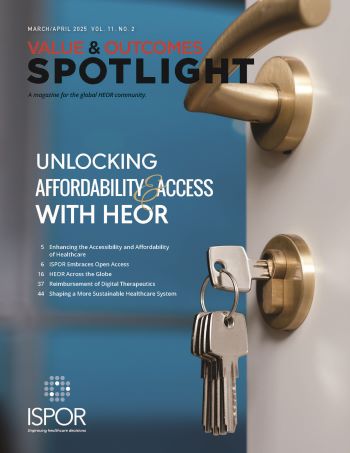HTA Policy Update
Section Editors: Sandra Nestler-Parr, PhD, MPhil, MSc; Ramiro E. Gilardino, MD, MSc
Welcome to the HTA Policy Update, which provides a brief update on notable HTA policy developments from around the globe. We welcome suggestions and guest editorials for future issues. Please contact the Value & Outcomes Spotlight editorial office with your ideas.
EU Joint Clinical Assessment
The European Union (EU) has advanced the implementation of the Health Technology Assessment Regulation (EU HTAR), effective since January 12, 2025. The regulation aims to streamline clinical evaluations of health technologies across EU member states, reducing duplication and facilitating the accelerating patient access to innovative treatments.
Under this framework, Joint Clinical Assessments (JCAs) are now mandatory for new oncology medicines and advanced therapy medicinal products submitted to the European Medicines Agency for marketing authorization. From 2028, all novel orphan drugs will be subject to EU HTAR, followed in 2030 by all other drugs, in vitro diagnostics, and high-risk medical devices. Early experience suggests a structured and harmonized approach of the JCA, with EU authorities collaborating with industry stakeholders.
The Belgian HTA body, INAMI-RIZIV, is to lead the EU consortium of 34 HTA bodies from 21 member states, following the January 2025 framework contract award. Drawing on its BeNeLuxA coalition experience, the consortium is backed by €35 million from the EU4Health Program and operates under the Heads of HTA Agencies Group and the HTA Coordination Group to enhance collaboration and transparency in JCAs and Joint Scientific Consultations (JSCs).
The European Commission launched the first submission window for JSCs on medicinal products from February 3 to March 3, 2025, with the next round set for June 2-30, 2025. The European Commission’s implementing act for JSCs on medical devices, adopted on January 24, 2025, ensures transparency and consistency for medical devices and in vitro diagnostics.
Stakeholder engagement is prioritized, with ongoing workshops and guidance documents aiding navigation, and a stakeholder network meeting planned for July 2025.
As the regulation takes full effect, EU officials are committed to refining processes to improve efficiency and promote timely access to high-value health technologies.
International Collaboration
In a landmark collaboration, the Institute for Clinical and Economic Review (ICER) in the United States, the United Kingdom’s National Institute for Health and Care Excellence (NICE), and Canada’s Drug Agency (CDA-AMC) launched the Health Economics Methods Advisory (HEMA) initiative.
This initiative unites HTA experts, methodologists, and academics to advance research on global health economics and HTA methodologies.
Key objectives of HEMA include:
- Evaluating health economic methodologies to assess their applicability in HTA decision making
- Providing guidance and recommendations on the adoption and modification of novel methodologies
- Publishing research findings through white papers, peer-reviewed articles, workshops, and webinars to inform HTA best practices internationally
Chaired by Professor Mark Sculpher of the University of York, HEMA integrates diverse perspectives from methodologists, patients, and industry experts, aiming to generate evidence-based guidance adaptable to different HTA contexts. As healthcare decision making grows more complex, HEMA’s work is expected to shape the future of HTA methodologies, supporting evidence-based policy across the United States, the United Kingdom, Canada, and other interested jurisdictions.
In March 2025, HEMA selected its first research topic, focusing on the benefits of treatment that should be considered in HTA decision making. With growing literature on additional benefits in economic analyses, HEMA will evaluate which proposed benefits—such as increased patient hope—should be incorporated into HTA studies. The project will develop specific guidance for HTA organizations on identifying new benefits, implementation strategies, and measurement challenges. The scoping phase is now underway, with a final report expected in December 2025.
Country Updates
Spain has refined its HTA framework with a new Royal Decree, enhancing transparency, efficiency, and patient involvement in the evaluation process.
Initially proposed by the Spanish Ministry of Health in August 2024, the decree establishes a structured and independent HTA system aligned with the EU HTAR. A key feature is the distinction between clinical evaluations, assessing the added clinical value of health technologies and non-clinical evaluations, which consider cost-effectiveness, ethical implications, and social impact.
The governance structure includes:
- Governance Council, chaired by the Secretary of State for Health, with health economists, patient representatives, and regional authorities
- HTA Evaluation Offices under the Spanish Agency of Medicines and Medical Devices (AEMPS), responsible for clinical and economic assessments
- Health Technology Appraisal Group, synthesizing findings to guide National Health System (SNS) decisions
The decree emphasizes real-world evidence and patient input and, after a period of consultations, the final version is now under review by the State Secretariat Council, with adoption and enactment expected by April 2025.
In addition, Spain’s Pharmaceutical Industry Strategy 2024-2028, launched in December 2024, aims to align HTA, pricing, and reimbursement systems while boosting research and development and real-world evidence generation. The plan introduces a new cost-effectiveness evaluation system, early dialogue with authorities, accelerated access pathways, and public-private partnerships to drive innovation. These measures position Spain to adapt to evolving EU regulations and aim to enhance patient access to medicines.
Emerging Trends To Watch
The German Institute for Quality and Efficiency in Health Care (IQWiG) is refining its General Methods (Version 8.0) to better integrate patient perspectives in HTA. Through questionnaires, interviews, public consultations, and committee representation, IQWiG aims to gather input from patients with lived experiences. Continuous evaluation and support for plain language summaries will enhance transparency and accessibility. Stakeholders can submit comments on the draft until April 29, 2025.
The French National Authority for Health (HAS) unveiled its 2025-2030 strategy, emphasizing economic evaluations to better assess the efficiency of innovative health technologies. With the establishment of a new economic evaluation department, HAS aims to manage uncertainty in benefit assumptions, strengthen early dialogue with innovators, and enhance public decision-making support.
The editors acknowledge this issue’s contributions from Dr. Dan Ollendorf, Dr. Jose Diaz, and Dr. Carlos Martin Saborido.

